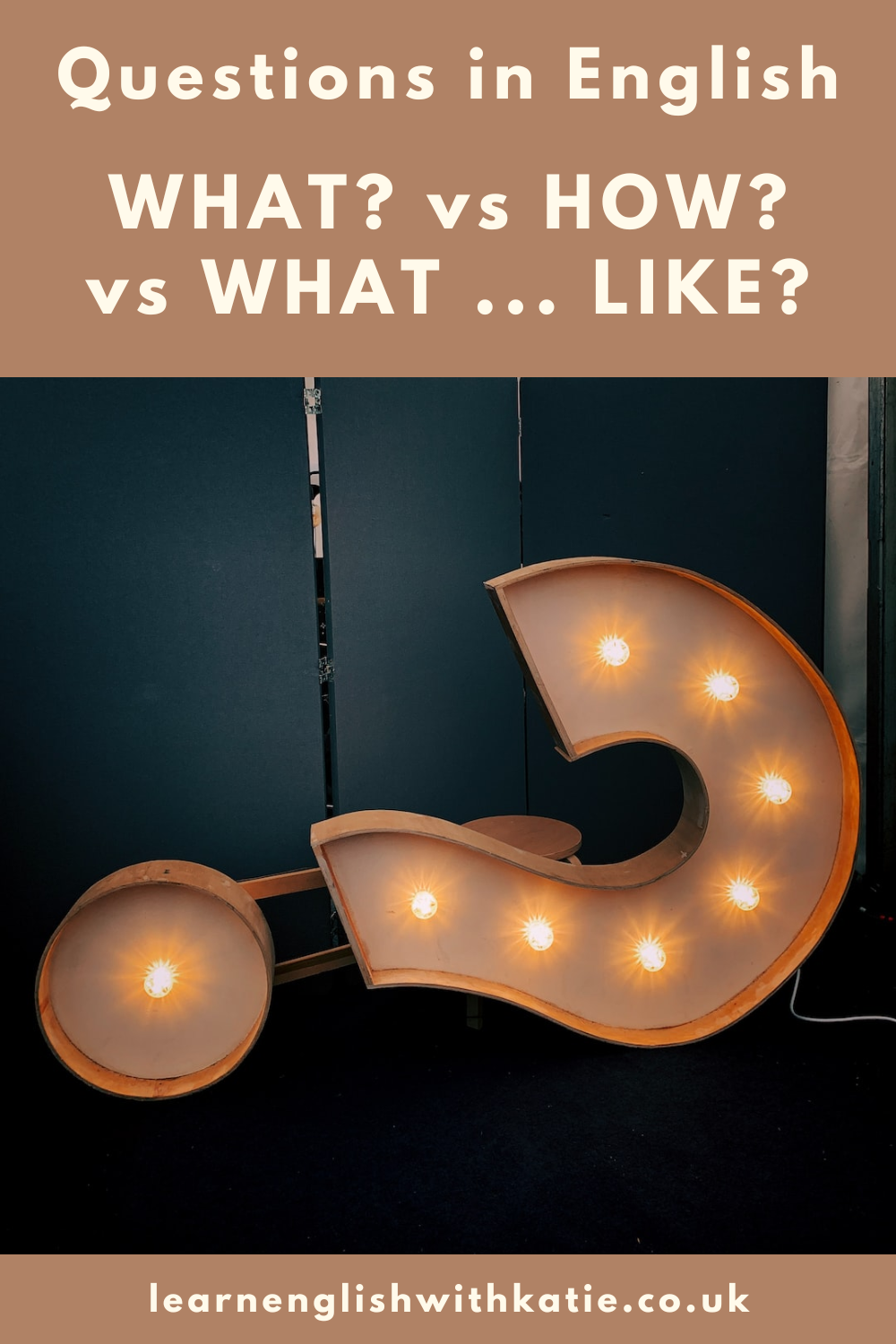|
I’ve noticed that some learners confuse “what?” and “how?” in certain situations. English speakers also make questions with “what … like?” quite often. In today’s lesson, I’ll try to show you the differences between these three questions. I'll also give you lots of useful examples. What questions We use “what” to ask for information: What time is it? / What’s the time? What’s your name? What does this word mean? What happened? What are you doing this weekend? We also use “what” to ask somebody for their opinion: What’s your favourite colour? What kind of music do you like? What do you think of her new husband? How questions How We use “how” to ask “in what way”: How can I improve my speaking? How did you learn to play the piano so well? How do I get to the station from here? How do I book a lesson with you? How can I help you? We also use “how” to ask about somebody’s opinion or experience: How was your flight/ your exam / the concert? How did you enjoy the film? How was work today? We can use “how” to ask about health, happiness and well-being: How are you? (If people ask “How are you?” the answer is often an automatic “Fine, thanks. And you?”) How are you doing? / How are things? (This is like “How are you?” but I really want to know the answer!) How are you feeling? (This could be about health or emotions. Again, I really want to know the answer.) How’s it going? (This could mean life in general or something more specific, such as a particular work project.) How’s life? (This is a good question for a friend who you haven’t spoken to for a while. It means “How are you? What’s your news?”) How’s your mother? (Perhaps I know she’s been sick.) How was your day/week? Some other uses of “how”: How does the story end? How do you like your tea? How is your new job better than your old one? How long “How long” questions are usually about time: How long have you worked / been working here? How long have you known each other? How long does it take (you) to get to work/London? How long does it take you to get ready in the mornings? But they can also be about length: How long is the River Nile? How far “How far” questions are about distance: How far do you have to travel to get to work? How far can you swim? How much/many Use “how much” for uncountable nouns and “how many” for countable nouns: How much chocolate do you eat? How many cups of tea and coffee do you drink a day? How much does this cost? How + adjective/adverb How often do you go to the cinema? How easy is it to get a job in your country? How well do you know Peter? How tall are you? How fast is your car? How difficult was your exam? What … like? This means “Tell me about …” or “Describe … to me.” What was the weather like? What’s your hometown like? What are her parents like? (I’m most likely asking about their personality.) What’s your new teacher like? (= What’s her personality? Is she a good teacher? Do you like her?) Compare “What … like?” and “How?” “What … like?” questions are asking for a description. “How?” questions are often asking for a more personal or emotional answer. For example: What’s your new house like? (= Describe your new house.) - It’s a detached house with four bedrooms and a small garden. How’s the new house? (= Are you happy there?) - I love it! I settling in really well, thanks. What’s Cambridge like? (= Describe Cambridge.) - It’s a small city with lots of beautiful old buildings. How’s Cambridge? (= How is Cambridge life for you?) - It’s great, thanks! Everything’s going really well! Frequently confused questions Compare these questions and answers: What does she look like? (Appearance) - She’s tall with blonde hair and blue eyes. What is she like? (Personality) - She’s kind and friendly. What does she like? (Interests) - She likes meeting friends and eating ice cream. How is she? (Health) - She’s very well, thanks. A couple of years ago, I wrote a book on how to ask questions in English. This is something a lot of my students have problems with because the grammar is a bit complicated. Over the last few weeks, I’ve been working on some improvements, including adding more exercises and more useful questions for everyday conversations. So if you would like more help with how to ask and answer questions, you can get my e-book here:
0 Comments
Your comment will be posted after it is approved.
Leave a Reply. |
About the blogFollow the blog for mini lessons and tips on how to improve your English. Categories
All
Archives
July 2024
|

 RSS Feed
RSS Feed
